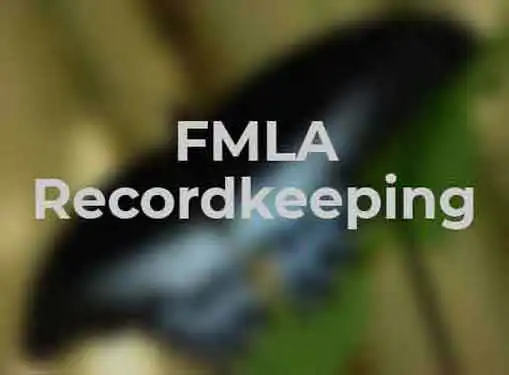Family and Medical Leave Act (FMLA)
FMLA Recordkeeping Requirements
The Family and Medical Leave Act includes recordkeeping mandates for employers. If you don't know what those mandates are, your business may be violating federal law.
The Family and Medical Leave Act was a major win for American workers.

Squeezed by family obligations and workplace demands, FMLA legislation provides limited, unpaid relief for employees who need to step out of their work positions to attend to major events in their personal and family lives.
For employers, FMLA has been a mixed bag. In general, employees who take advantage of FMLA leaves return to their positions with greater focus and clarity, and tend to be more satisfied with their positions than they were before they went on leave. Unfortunately, these benefits often come at the expense of disruptions the workplace. Since the employer needs to keep the individual's position open for the twelve weeks allotted by FMLA, the rest of the workforce usually has to carry a heavier load until the worker returns.
Employers covered by FMLA need to fulfill recordkeeping requirements to remain legally compliant. There are no FMLA reporting requirements, but employers should make every effort to conform to recordkeeping standards since violations can result in penalties down the road.
Recordkeeping Procedures
Employers that are covered by FMLA must maintain records for a period of at least three years. The Department of Labor doesn't require that these records be kept in any specific form or order, but you must be able to provide records to DOL representatives upon request. If your records are computerized, they'll need to be copied and reproduced in hard copy format.
Basic Payroll Requirements
FMLA guidelines require employers to maintain basic payroll information for their employees, in accordance with the Fair Labor Standards Act. This includes identifying information (e.g. name, address, etc.), pay rate, compensation terms, additions/deductions from payroll, and total compensation. Although it might seem unnecessary, this information could come into play later if an employee claims they weren't offered a comparable position at the end of a leave.
FMLA Requirements
Employers are also required to maintain records for FMLA leaves that were taken by their employees. These records include dates (or hours) of leaves taken, notices given to you by employees, notices you gave employees, documentation of the company's employee leave policies, premium payment records (for benefits), and documentation of disputes arising from an FMLA leave. When compiling FMLA records, remember that any documents related to an employees' medical history or current medical condition need to be filed separately from his personnel file to comply with medical confidentiality requirements.
Share this article
Additional Resources for Entrepreneurs




Conversation Board
We greatly appreciate any advice you can provide on this topic. Please contribute your insights on this topic so others can benefit.